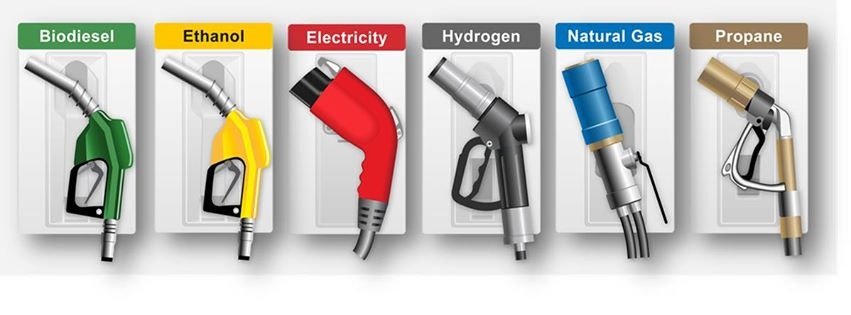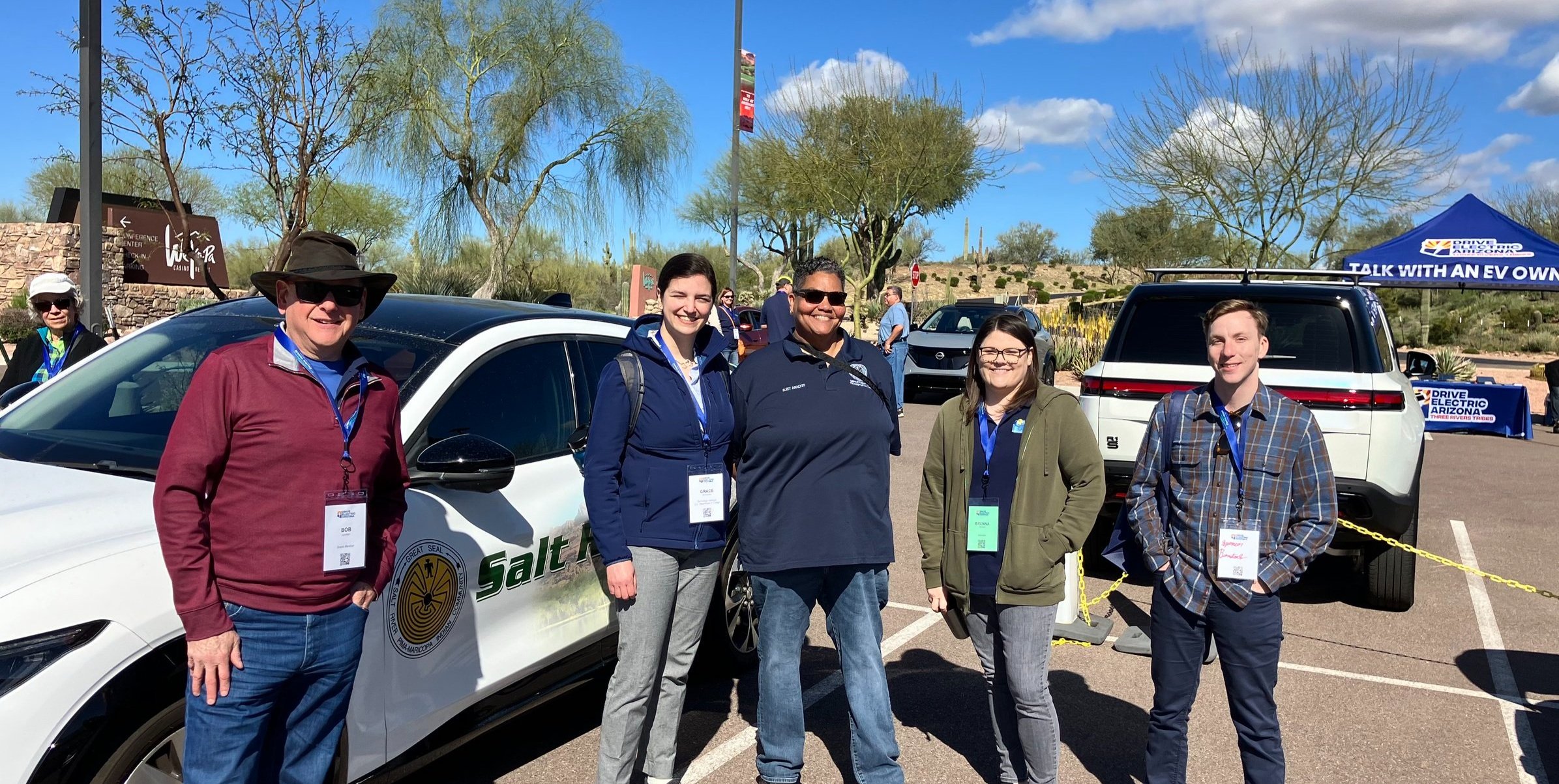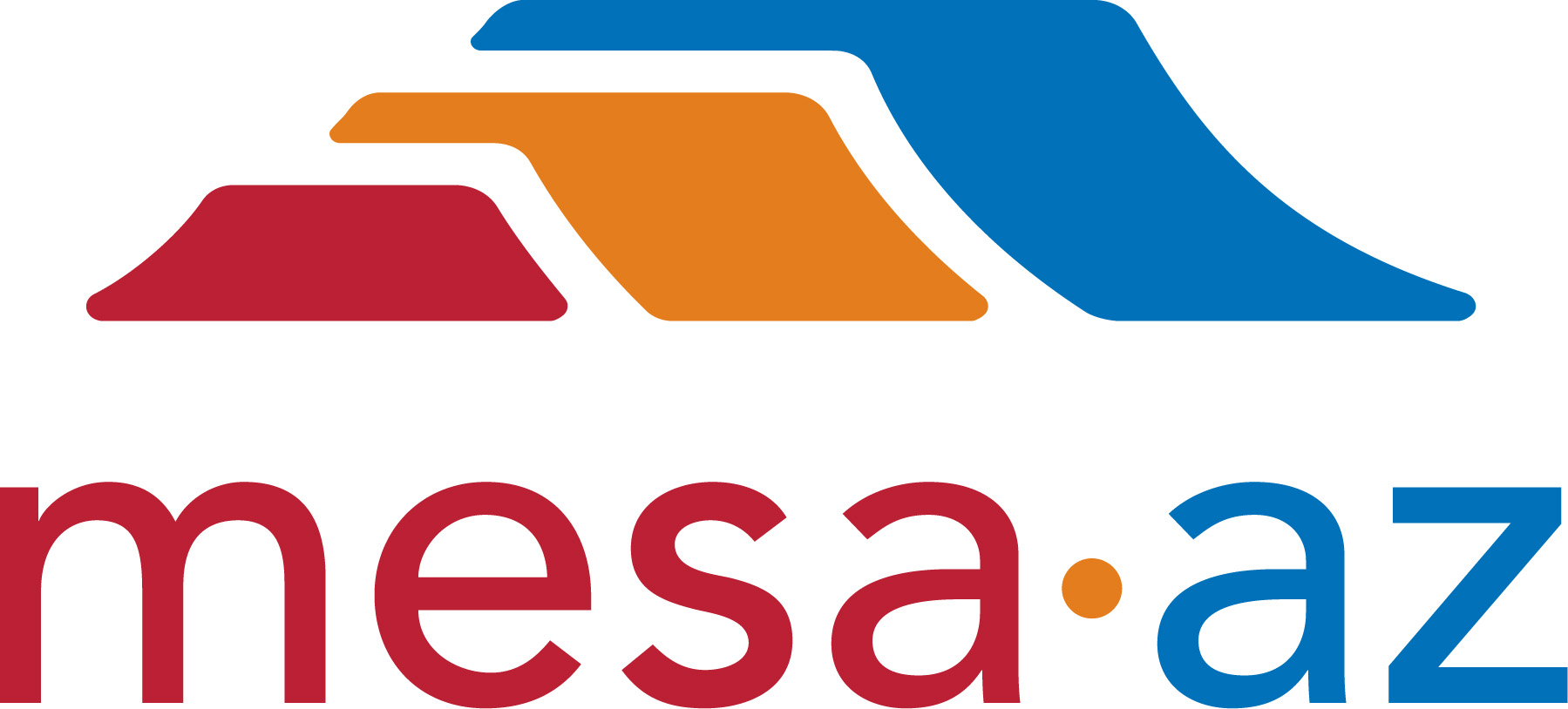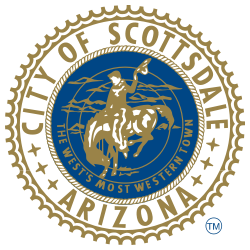In This Issue
Alternative Fuels For a Healthy Planet
Drive Electric Arizona Events
Events and Funding
Member Spotlight: City of Scottsdale
Alternative Fuels For a Healthy Planet
As we celebrate Earth Day this month, we just wanted to remind everyone of the importance of alternative fuels and their effects on the health of our planet and our communities. Alternative fuels are fuels that are derived from sources other than petroleum. Most are produced domestically from either renewable or non renewable sources and they can produce less pollution than conventional gasoline and diesel powered vehicles. The following fuels are considered alternative fuels; biodiesel, ethanol, natural gas, propane, hydrogen, and electricity. Other alternative fuels such as renewable diesel, and sustainable aviation fuel are also becoming more available.
Fuels such as biodiesel, ethanol, renewable diesel and sustainable aviation fuel are created using renewable sources like plants such as corn and soybeans as well as animal fats and even used cooking oils. These fuels have lower life cycle emissions because the carbon that is released when burning the fuel is offset by the carbon captured by the plants used to make it. For example using 100% biodiesel fuel can reduce carbon dioxide emissions by 74% when compared to diesel.
Natural gas and propane are cleaner burning fossil fuels that are plentiful in the USA. According to Argonne National Laboratory, light-duty vehicles running on conventional natural gas can reduce life cycle greenhouse gas emissions by 15%. If these fuels are made from renewable sources that reduction in emissions is even greater. For example renewable natural gas is made by capturing and treating biogas that is produced at landfills, and livestock operations such as dairy farms. This prevents the release of harmful methane into the atmosphere at these operations and decreases tailpipe emissions.
Hydrogen and electricity are both potentially emissions-free alternative fuels. Hydrogen can be produced domestically from resources like natural gas, coal, solar energy, wind, and biomass. Once produced, hydrogen generates electrical power in a fuel cell, emitting only water vapor and warm air. Electricity can be used to power electric vehicles, including all-electric and plug-in hybrid electric vehicles (PHEV’s). All-electric vehicles produce zero tailpipe emissions, and PHEVs produce no tailpipe emissions when operating in all-electric mode. However, the total life cycle emissions of an electric vehicle depends on the sources of the electricity used to charge it.
The adoption of these different alternative fuels is an important step that many are taking to ensure a cleaner, healthier future for us and our planet.
Drive Electric Arizona Events
At Three Rivers Tribes Chapter Launch. Left to Right is Bob Levitan of DEAZ, Grace McGinnis of DOE’s Vehicle Technologies Office, Tonya Glass of SRPMIC Fleet, Brenna Covert VSCCC, and Spencer Bienstock of Western Washington Clean Cities.
DEAZ at Earth Day Ride and Drive Event.
Phoenix Earth Day Ride and Drive April 20th.
City of Phoenix Office of Sustainability at Earth Day Ride and Drive.
Three Rivers Tribes Chapter Launch and Earth Day Ride and Drive
April was a busy month for our partners at Drive Electric Arizona (DEAZ). DEAZ is an electric vehicle group dedicated to advancing the adoption of EV’s in Arizona. We were happy to be able to participate in and support two of their many events. First was the April 6th launch of DEAZ’s newest chapter The Three Rivers Tribes. This chapter encompasses three of our regions tribal nations including Fort McDowell Yavapai Nation, the Salt River Pima-Maricopa Indian Community (SRPMIC) and the Gila River Indian Community. The Three Rivers Tribes Chapter is the first tribal electric vehicle group in the country! The chapter launch consisted of a 3 part traveling EV showcase that visited each of the tribes in the new chapter. EV’s were brought to The Wekopa Resort at the Fort McDowell Yavapai community, SRPMIC’s Talking Stick Resort and lastly at the Gila River Resort and Casino. We were also lucky to be able to host one of our friends from the Department of Energy, Grace McGinnis, at this first of its kind event.
We were proud to support Phoenix’s Earth Day Ride and Drive this last weekend. We partnered with the City of Phoenix’s Sustainability Department, Drive Electric Arizona and Valley of the Sun Electric Vehicle Association to put on this successful Earth Day event. There were over 25 models of EV’s available for attendees to test drive, EV owners on hand to answer questions, and informational booths from vendors such as SRP, American Lung Association, Maricopa County and more. The event even had electric bikes on display courtesy of The Bike Barn. It was a great Earth Day weekend!
Upcoming Events
Join Drive Electric Arizona and SRP for an EV ride and drive event April 27th! Take an EV for a spin and talk with EV owners.
Learn more about this event and others at: https://www.driveelectricaz.org/
Join us May 20-23, 2024, at the Las Vegas Convention Center in Nevada for the Advanced Clean Transportation (ACT) Expo.
ACT Expo is the largest conference and trade show highlighting the most advanced transportation technologies and clean fuels available in the marketplace today. The show serves as the official annual meeting place for 12,000+ transportation leaders looking to gain insight and hands-on access to the fuels, technologies, and vehicles driving the future of transportation. ACT Expo features dozens of product debuts and major announcements from leading OEMs and suppliers, unparalleled networking opportunities with the most influential and progressive leaders in the industry, peer-to-peer learning for progressive fleet operators, and access to the most extensive assembly of advanced commercial vehicles anywhere.
NAFA Arizona Lunch & Learn
Managing Expectations – Supply Chain Issues
May 16 @ 11:00 a.m. – 1:00 p.m. MT
The NAFA Arizona Local Networking Group invites you to attend a lunch and learn event with a panel discussion on Managing Expectations - Supply Chain Issues in 2024. The lunch will take place at Postino in Tempe.
Where: Postino, 615 S College Ave, Tempe, AZ 85281
Registration Fee: $35 NAFA Members and $40 for non-members and guests (lunch is included in the registration fee)
Registration Deadline: May 15
Funding Opportunities
Clean Energy Technology Deployment on Tribal Lands
DOE has announced that the funding available under the Clean Energy Technology Deployment on Tribal Lands has doubled, increasing from $25 million to $50 million.
Eligibility: The DOE Office of Indian Energy is soliciting applications from Indian Tribes, which include Alaska Native Regional Corporations and Village Corporations, Intertribal Organizations, and Tribal Energy Development Organizations, to install clean energy technology on Tribal lands. Nonprofits are encouraged to share this information with Indian Tribes in their network.
Deadline: Applications are due May 30, 2024, at 5 p.m. ET.
Communities Taking Charge Accelerator Funding
The Biden-Harris Administration announced a $54 million Communities Taking Charge Accelerator funding opportunity to enhance electric mobility in communities without access to home charging infrastructure and to transition all types of fleets to electric vehicles. It also focuses on developing managed charging solutions to optimize grid efficiency and integrate renewable energy to promote sustainability, economic growth, and community health. Applicants must submit a concept paper by May 20, 2024, and full applications are due July 16, 2024.
Topics include:
Solving for No-Home Charging: Expanding Charging Access for Privately Owned E-Mobility
Expanding E-Mobility Solutions through Electrified Micro, Light and Medium-Duty Fleets
Managed Charging for Clean Reliable Energy.
Clean Energy to Communities Peer Learning Cohorts
Clean Energy to Communities Peer-Learning Cohorts are multi-community engagements that convene regularly for approximately 6 months to exchange strategies and best practices, learn in a collaborative environment, and workshop policy or program proposals, action plans, or strategies to overcome challenges around a common clean energy transition topic. Lab experts provide a cohort of up to 15 communities with education, case studies, analysis and modeling tools, templates, trainings, and facilitated collaboration to enable accelerated clean energy progress.
The Clean Energy to Communities (C2C) cohort, “Charging a Path to Municipal Fleet Electrification” has open applications through April 30. Municipal and municipal utility fleets are encouraged to apply.
Free Technical Assistance for Bus Fleet Electrification
The new Clean Bus Planning Awards (CBPA) program from NREL, funded by the Joint Office of Energy and Transportation, offers technical assistance to create free action plans for transit agencies and school districts to get their electric fleets rolling. CBPA also offers deployment assistance for participating fleets, making it easy to transition from planning to implementation.
Technical Assistance for States and Public Utilities
The Resources and Assistance for State Energy Offices and Regulators Program offers state public utility commissions and state energy offices easy access to technical support from subject matter experts at DOE's national laboratories, including NREL. Three support offerings are available—Help Desk, Expert Match, and Deep Dive. Find additional program details and complete the online intake and application forms on the State Technical Assistance Program page.
The city of Scottsdale is ranked as one of the most desirable communities to live and work in and is also a popular tourist destination in Arizona. Scottsdale has also been a long time member of Valley of the Sun Clean Cities Coalition and shares our goal of improving air quality through the use of alternative fuels. Over the years the city has worked to reduce emissions and continues to explore sustainable solutions for its fleet and operations. For example, the city uses Compressed Natural Gas in its solid waste trucks and bus trolleys and will soon be using Renewable Natural Gas in these vehicles for even greater carbon reduction.
VSCCC strives to provide alternative fuel information to all people within our region. In order to increase our outreach abilities we are working with local agencies to share our newsletter and clean fuel resources with an even greater audience. We are proud to partner with the Inter-Tribal Council of Arizona's Air Quality Department, ASU's Sustainable Cities Network and Maricopa County Air Quality Department.
OUR NEWSLETTER IS ALSO AVAILABLE IN SPANISH
Translations done by Diego Montemayor- Diego@cleanairaz.org



















